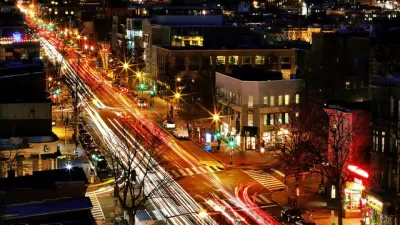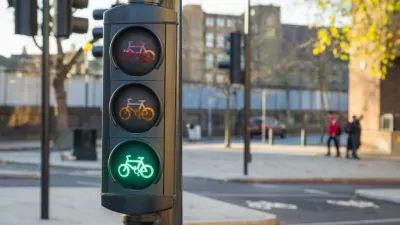Author Russell Shorto claims that "the willingness of Europeans to follow top-down social planning" makes public transit and bicycling more feasible in European cities than they are in the States where people don't always agree with technocrats.
According to Shorto, factors like geography, public policy, and the collective mindset of people in society contribute to the resounding success of the Amsterdam model.
On the first point, "America is spread out, while European cities predate the car," writes Shorto in The New York Times Op-Ed. Secondly, Dutch laws mandate that children pass the bicycle safety exam, make it costly for people to obtain a driver's license, and deliberately keep cab fares high. "[A] trip from the airport may cost $80 [on a taxi], while a 20-minute bus ride sets you back about $3.50," he points out. Then there's the general perception of cars. Buses in Holland aren't the last resort for mobility just as cycling isn't a green alternative to cars. "[I]t's a way to get around," Shorto says.
His conclusion? "For American cities to think outside the car would seem to require a mental sea change."
Russell Shorto is the author of "The Island at the Center of the World."
FULL STORY: The Dutch Way: Bicycles and Fresh Bread

Planetizen Federal Action Tracker
A weekly monitor of how Trump’s orders and actions are impacting planners and planning in America.

Map: Where Senate Republicans Want to Sell Your Public Lands
For public land advocates, the Senate Republicans’ proposal to sell millions of acres of public land in the West is “the biggest fight of their careers.”

Restaurant Patios Were a Pandemic Win — Why Were They so Hard to Keep?
Social distancing requirements and changes in travel patterns prompted cities to pilot new uses for street and sidewalk space. Then it got complicated.

Platform Pilsner: Vancouver Transit Agency Releases... a Beer?
TransLink will receive a portion of every sale of the four-pack.

Toronto Weighs Cheaper Transit, Parking Hikes for Major Events
Special event rates would take effect during large festivals, sports games and concerts to ‘discourage driving, manage congestion and free up space for transit.”

Berlin to Consider Car-Free Zone Larger Than Manhattan
The area bound by the 22-mile Ringbahn would still allow 12 uses of a private automobile per year per person, and several other exemptions.
Urban Design for Planners 1: Software Tools
This six-course series explores essential urban design concepts using open source software and equips planners with the tools they need to participate fully in the urban design process.
Planning for Universal Design
Learn the tools for implementing Universal Design in planning regulations.
Heyer Gruel & Associates PA
JM Goldson LLC
Custer County Colorado
City of Camden Redevelopment Agency
City of Astoria
Transportation Research & Education Center (TREC) at Portland State University
Camden Redevelopment Agency
City of Claremont
Municipality of Princeton (NJ)




























